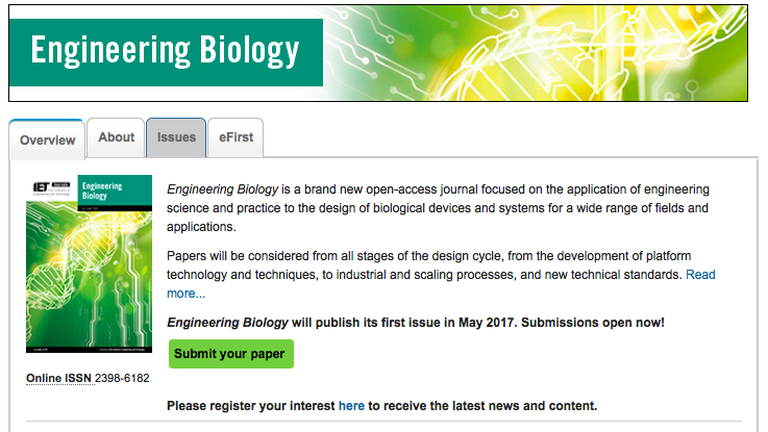Engineering Biology: the new IET open access journal
- Posted on 22 May, 2017

The Institution of Engineering and Technology (IET) has launched a new journal, entitled Engineering Biology, to reflect the fact that synthetic biology/engineering biology is, fundamentally, now widely recognised as a field of engineering. Whilst the biological aspects of the field are, of course, critically important, biology is a fundamental science - whilst engineering biology is applied science. Perhaps a useful comparison is the difference between chemistry and chemical engineering – both of which are extremely important, yet very different, disciplines.
Biology, almost by definition, is highly individualistic and involves a great deal of manual input. Consequently, the results of biological research are sometimes variable and often difficult to reproduce. The methodology and results tend to be qualitative rather than quantitative. In contrast, synthetic biology/engineering biology has a very different approach. Engineering biology is highly automated (one example being DNA foundries). Engineering biology is a key driver of the bioeconomy and, consequently, results need to be reliable and reproducible by multiple groups. Such an approach involves technical standards, sophisticated methods of metrology and a high degree of quantitation. Underlying this is the need for detailed modelling and mathematical descriptions of processes. All these components are required for the level of reliability and reproducibility necessary for industrial translation.
The aim of Engineering Biology is to reflect the rapid developments in research in synthetic biology/engineering biology. However, in addition, the journal will address industrial translation, as this is an important dimension to the field. The format of the journal is designed to allow the rapid turn-round of good papers that cover material across a wide range of topics in synthetic biology/engineering biology. Engineering Biology is designed to address not only fundamental research, but, also, application projects - both academic and industrial. An important aspect of the journal is that these areas will be coupled to peer review, constructive feedback to authors and rapid publication. The journal is fully open access, ensuring that it is compatible with the publishing requirements of the funding bodies. It is supported by a comprehensive editorial board of international experts from across the world.
Share this article:
